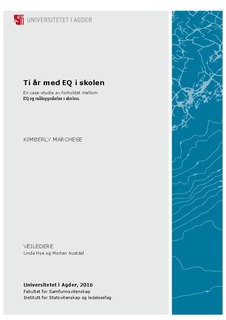| dc.description.abstract | Purpose and Research
The goal of this thesis has been to find out to what extent the systematic introduction of "EQ in school" has succeeded, and in which areas. I have also focused on finding out through theory and examination of a selected unit whether EQ has a connection with achievement. For Norwegian schools to be able to adopt new methods that promote a positive in-school learning environment, it is important that those responsible can make informed decisions, and that information on new methods are based on research and results. According to Norwegian school researcher Thomas Nordahl, the learning environment is crucial for students to succeed in school (Amundsen, 2015). Methods that are introduced in schools can have a large impact on learning, achievement and the well-being of students. The school environment may in many cases have a great economic impact. It can mean the difference between whether a student completes or leaves school. In Sweden "EQ in school" is prevalent in many schools, but in Norway, Langhus school is the first school that has adopted "EQ in school" as a methodology. The school has introduced EQ into the school schedule and has completed this in a systematic way for over ten years. The Langhus school can therefore refer to extensive experience and results in the use of emotional intelligence. With this in focus my issue is:
How does Langhus School implement "EQ in school", and to what are the perceived effects the employees have of the " EQ in school" method?
Method and Analysis
The method I have used in the study is a qualitative approach, and semi-structured group interviews. By using this method I was able to put in focus issues seen from a variety of perspectives. I opted for a phenomenological approach that extracts from my own experience as a teacher which in turn can strengthen the thesis, and it is derived theory and research from a variety of data sources and multiple independent researchers to strengthen the study's credibility (Thagaard 2013). The pool was 6 respondents from the Langhus School. The Respondents were asked about their work related to "EQ in the schooling environment" and about their attitudes and experiences.
Result highlights
My findings from the theoretical part of the study shows that there is a correlation between emotional intelligence and achievement, and that EQ can be measured.
Results from previous research may suggest that students with high emotional intelligence achieve better academic results than those with a lower emotional intelligence. Findings from the theoretical part of the research shows that teaching emotional and social skills are important at school, and that it affects academic performance not only in the time they are taught, but in the years that follow. Through theory in the fields of neuropsychology, and authors who write about the topic of emotional intelligence, it is suggested that one can develop ones emotional intelligence throughout ones whole life.
Findings from the qualitative analysis, points out that the school has succeeded in introducing the method, and that method has now become a permanent part of school culture.
Respondents say they have a good working environment and high levels of satisfaction among students. The Respondents explain that the school over many years, have had the lowest sickness absence among staff of any organization in the Ski Municipality. It is difficult to conclude whether this is due to the introduction of the EQ methodology, or whether it due to other factors. Respondents tell that the school has many high achieving students and a positive learning environment, but they cannot be sure if it's exclusively due EQ methodology. The results highlight that the teacher's role in this project can have a great impact in the positive development of the school. The Respondents consensus is there has been a positive change among the staff after they started with "EQ in the schooling environment", and that the training methods have influenced them to become more aware of their own feelings.
The biggest challenge Langhus school has faced with the "EQ in the schooling environment" methodology, has been providing adequate EQ methodology training for new employees. Respondents experience that there is room for improvement. Another challenge the school faces is the organization around EQ classes, which requires sharing resources. The management at the school are decided that classes should be divided in half during EQ lessons, which creates confidence in the group, and teachers have a shared consensus that the teachings of EQ in lessons are working fine. As the Langhus School have good results in achievement and satisfaction, they will continue with "EQ in the schooling environment" and will work continuously to improve the work they do with emotional intelligence. | nb_NO |

